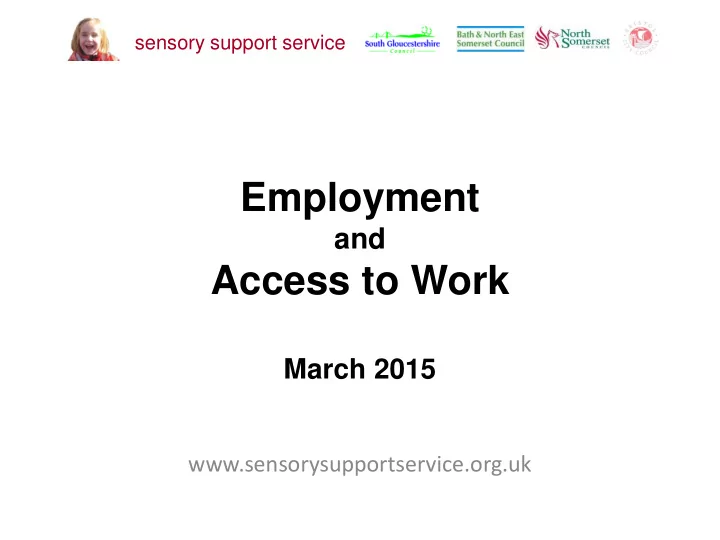

sensory support service Employment and Access to Work March 2015 www.sensorysupportservice.org.uk
The background • Equality Act (2010) Disability – ‘a physical or mental impairment which has a substantial and long-term adverse effect on [your] ability to carry out normal day-to-day activities’ This can include disabilities that are only discovered or apparent in the workplace • Reasonable adjustments Duty on employers to make reasonable adjustments for employees (including at interviews)
Access to Work • A grant to pay for any additional costs in the workplace which arise from a disability, medical or mental health condition • Not repayable • Does not affect tax or benefits (although people on some benefits, eg Incapacity Benefit, are not eligible for Access to Work) • Not means tested • Amount paid depends on personal situation
Core values and principles of Access to Work • Additional costs - can help with costs which are over and above what a non-diasabled person would require to do their job • Meeting minimum needs – provides support that allows individuals to overcome workplace barriers that arise from their disability • Above and beyond – support from Access to Work is above and beyond a reasonable adjustment and does not replace an employer’s legal duty to make reasonable adjustments • Value for money – Access to Work provides support that meets minimum needs in the most cost-effective way for taxpayers (Access to Work 2015)
Who can get Access to Work? • Over 16 • Looking for work, about to start work, in a full or part-time paid job or self-employed (voluntary work is not eligible) • Have a disability, health or mental health condition which impacts on a job • Have a condition which means that they could have to pay work-related costs (eg for specialist computer software, support worker or travel costs)
What does it pay for? Things like: • Special equipment, technology or software • Support workers • Help with transport costs if public transport cannot be used due to condition • Disability awareness training for other staff • Adaptions to the workplace • Support for interviews • Cost of moving equipment if you change job or location
How do I get Access to Work? • Information can be found on www.direct.gov.uk Home>benefits>carers and disability benefits>Access to Work • Apply early, particularly if you want support for an interview • Do your homework – think of different interview methods (eg group activities, Skype, telephone interviews) and work situations, how you would manage these and if anything would help
Further information • www.actiononhearingloss.org.uk • www.bbc.co.uk/news/blogs/ouch/ • www.businessdisabilityforum.org.uk • www.disabilityrightsuk.org • www.gov.uk for both DSA and Access to Work • www.limpingchicken.com
Recommend
More recommend